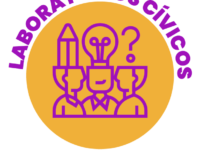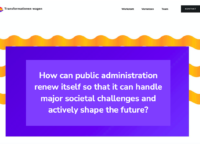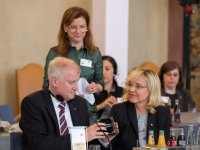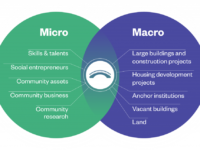Bogotá-Colombia is a city co-administered by 20 local mayor's offices. In the past, it was on the Mayor's power to allocate resources without necessarily go through public or community consultations, which is why several city infrastructures emerged without responding to specific needs nor recognizing the diversity in the population. With the Civic Laboratories of participatory budgeting, the community began to engage on where to decide where to invest their local budgets.
Innovation Tag: Methods
Transformation Wagen - "Daring Transformations" is a learning programme co-developed with and for public servants in the field of Environmental Politics in Germany. Aiming at enhancing tools for public administration to renew itself, it creates capacities and methodologies to handle major societal challenges and foster a transformative mindset to actively shape the future and not just react to what is happening.
In cooperation with the Korean government, major companies, social enterprises, and international organizations, Ulsan Port Authority (UPA) has initiated a project of “upcycling plastic waste coming from ships,” aiming to solve harbor-specific ocean plastic pollution. The UPA has improved upon the policies on discharging plastic waste from ships and created an upcycled product using the plastic waste. The UPA’s practice has contributed to reduce ocean plastic pollution.
RLS-Sciences is a network supporting multilateral scientific cooperation between 7 regions on 5 continents, in the context of a political regional development forum. It was developed to take advantage of the scientific potential in the regions, to advance science via an organised network of cooperation, and to inform regional policies. The structured collaboration occurs at the intersection of science and government and is based on the principle of mutual trust and the culture of dialogue.
Public education systems around the world are struggling to find their way to innovate. Top-Down reforms have failed to achieve the needed transformation. Mifras has created and successfully implemented an innovative model to transfer schools into hubs of educational innovation. With a focus on supporting school administrators to establish an intrapreneurial culture and ensure sustainability of innovation developed for continued creation of relevant education ventures at their schools.
USE-IT!, Unlocking Social & Economic Innovation Together!, is a whole neighbourhood approach to addressing urban poverty.
It innovates by building bridges between the places, the people, the public sector, the private sector and civic society partners in a community so they can co-produce solutions to poverty that unlock opportunities and that fits their needs.
By doing this, USE-IT! works by respecting what is already there in a community rather than by assuming what needs to change.
The project was inspired by the need to promote coding in Greek primary education. It fostered the exploration of the actual use of digital technologies in the Schools, the way new technologies could transform School classrooms into real labs and the level of impact in the improvement of the digital skills of teachers and pupils.
The South Holland provincial authority is looking for ways to make the energy transition towards carbon neutrality a standard consideration in all its infrastructure management and maintenance activities. The province wants innovation to be a structural part of these activities, which has already produced the ‘N211 generates energy’ and ‘N470 generates energy’ projects.
DASA finds and exploits innovations which support the defense and security of the UK to help protect our people against our adversaries, faster and more effectively whilst generating economic value for the UK. We help businesses to grow and become successful. We provide funding and other support, helping people to access end-users, develop and test their products and linking our partners together.
Case Study
Ethnographic Project focused on the Tax Filing Experiences of the Homeless and Housing Insecure
The CRA undertook an ethnographic project focused on the tax filing experiences of the homeless and housing insecure. Researchers worked directly with persons from these populations to gain insight into barriers to accessing tax benefits. The project will improve services to vulnerable Canadians to enhance their standard of living, and underscores the value of innovative qualitative research.





